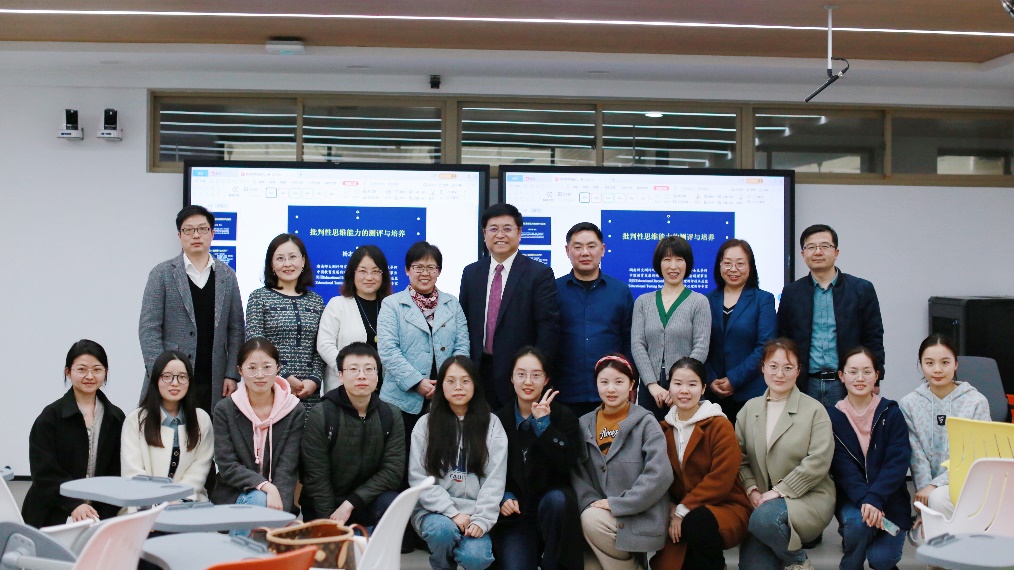2023年3月21日下午,香港中文大学博士、湖南师范大学测评研究中心主任、博士研究生导师杨志明教授应上海对外经贸大学语言教育与测评中心(CLEAR)邀请,在教学楼SD304为我院师生做了主题为 “批判性思维能力的测评与培养”的讲座。本次讲座由CLEAR中心主任蔡雨阳教授主持,我院院长温建平与副院长郭义、雷春林出席,以及我院近30名师生参加了此次讲座。
Invited by the Center for Language Education and Assessment Research (CLEAR), Professor Dr. Zhiming Yang from Hunan Normal University presented a Boya Forum talk on the Assessment and Teaching of Critical Thinking at Teaching Building SD304 on March 21, 2023. Professor Yang obtained his Ph.D. from The Chinese University of Hong Kong. He is currently director of the Assessment Research Center and Ph.D. candidate supervisor of Hunan Normal University. Professor Yuyang Cai, Director of CLEAR, chaired the session. Dean of School of Languages Professor Wen Jianping and Associate Deans Dr. Lei Chunlin and Guo Yi, together with a cohort of 30 teachers and students from the School of Languages and other faculties were in attendance.
讲座伊始,蔡雨阳教授对杨教授表示了热烈欢迎,并向各位师生介绍了杨志明教授的学术背景与研究项目。讲座中,杨教授分享了自己多年在美国及国内从事心理测量和教育评价的研究经历,并基于自身丰富的批判性思维测评经验,从批判性思维是什么、怎么测、如何培养三方面展开了深入说明。
The seminar commenced with Professor Cai’s warm welcome to Professor Yang, followed by a brief introduction to the speaker’s academic background and research projects. During the seminar, Professor Yang shared his experience working as a measurement methodologist serving enterprises and schools in the United States and China. Based on his rich experience in critical thinking assessment, he provided a profound account of what critical thinking is, how to measure it, and how to cultivate it.

讲座的第一部分,杨志明教授首先利用ChatGPT来导入,指出ChatGPT虽然看似像人一样拥有语言理解和文本生成的能力,但在提取抽象信息、逻辑推理等方面表现较差,继而引出批判性思维这一术语。据杨教授解释,批判性思维或审辩性思维指个体对思维目的性、条件性、逻辑性、恰当性和包容性等方面进行审辩质疑的思维技能和态度,是一个信息提取、分析整理、整合诠释、反思质疑、论证评价的过程。然后,他介绍了三大经典批判思维测评模型,即沃森·格拉泽批判性思维评价、加利福尼亚批判性思维技能测验以及康奈尔批判性思维测试,并进一步结合实例说明辨认、论证、推理都要符合逻辑。杨教授强调,当前知识增长迅猛、信息污染严重,我们有必要掌握批判性思维,学会审辩,高效判断信息真伪,才能发现和解决问题。
Professor Yang started his talk with ChatGPT as an example. He pointed out that although ChatGPT has the abilities of language comprehension and text generation like human beings, it performs insufficiently in extracting abstract information and logical reasoning. Then he highlighted the importance of critical thinking. As Professor Yang explicated, critical thinking refers to the thinking skills and attitudes of individuals who question and evaluate in terms of purpose, condition, logic, appropriateness, and inclusiveness. It is also a process of information extraction, analysis, integration, interpretation, reflection and questioning, and evaluation. Next, Professor Yang introduced the three classic critical thinking measures, i.e., the Watson-Glass Critical Thinking Appraisal (WGCTA), the California Critical Thinking Skills Test (CCTST), and the Cornell Critical Thinking Test (CCTT).Moreover, he illustrated that recognition, argumentation, and reasoning must conform to logic with some examples.Given the rapid growth of knowledge and serious information pollution, Professor Yang recommended that teachers and students should master critical thinking and learn how to effectively judge the authenticity of information to solve problems.
第二部分,杨教授分享了他们团队针对中国学生开发的批判性思维能力测评工具,测评内容包括阅读理解、逻辑推理、假设辨认、事实判断、论证评价和反思质疑六个方面,并详细解释了这些维度的定义。接下来,针对每个维度,杨教授展示了对应的题型设计和问题实例,邀请到场的师生回答和评价。围绕是否符合前提条件、假设是否合理、论断是否成立、强弱论点与问题的关系等,与师生们展开了热烈的互动,这样加深了师生对批判性思维的理解。
In the second part, Professor Yang shared a measure of Chinese students’ critical thinking ability recently developed by his team. This measure involves six dimensions: analytical thinking, inference, recognition of assumptions, deduction, interpretation, and evaluation of arguments. All of them were explained in detail to the present audience. Then, Professor Yang described their question item design and sample questions of each dimension and invited the teachers and students to answer and comment.Lively interactions arose between the speaker and the audience, focusing on the judgment of preconditions, reasonable assumptions, tenable conclusions, and relationships between strong or weak arguments and problems,,All these activities deepened the audience’s understanding of critical thinking.
第三部分,杨教授汇报了在国内中学做的实验研究成果,发现具有批判性思维能力的学生往往能取得更好的学业成绩,且受到过思维训练的学生在语言水平及其它学业成绩上都有明显进步。此外,杨教授建议通过采用合作式探究式的智慧体操等方案来培养学生的批判性思维能力。
In the third part, Professor Yang reported the results of a few experimental studies that they conducted in Chinese middle schools. The findings showed that students with critical thinking ability tended to attain better academic achievements and that students receiving training made great progress in language ability and achievements in other subjects. In addition, Professor Yang advocated developing students’ critical thinking through approaches such as collaborative and inquisitive intelligence gymnastics.

在互动和问答环节,现场的师生们积极提问,杨教授耐心细致地解答了各位师生的问题。杨教授的整场讲座,结合各种有趣的思维题,引发了师生的深度思考。参会师生与杨教授进行了深入交流和探讨,纷纷表示此次参会获益匪浅、深受启发。
During the interaction section, Professor Yang patiently and meticulously answered questions asked by the audience. The whole seminar involved various interesting questions and was quite thought-provoking. Through in-depth discussions with Professor Yang, quite a few teachers and students expressed that they were highly inspired.
CLEAR举办的本次博雅讲坛为师生们提供了一个学习和交流的平台,让大家更深入地了解批判性思维能力的测评与培养。最后,蔡教授和温院长对此次讲座作总结,对杨教授莅临本校做精彩的学术报告表达了诚挚的感谢。蔡教授代表研究中心邀请杨教授在本校开设评判思维课程,表达了与杨教授在后续研究中展开深度合作的愿望。温院长也强调在今后的教学和科研中要重视培养学生的批判性思维能力。
The Boya Forum sponsored by CLEAR provides a platform for students and teachers to rub shoulders with renowned scholars around the world. The talk by Professor Yang helped the audience to gain a deeper understanding of the assessment and instruction of critical thinking. At the end of the talk, Professor Cai and Professor Wen closed the event and expressed their sincere gratitude to Professor Yang for his enlightening talk. On behalf of CLEAR, Professor Cai invited the speaker for potential collaboration in further research on critical thinking. Professor Wen also stressed the importance of training students’ critical thinking.
供稿:徐修玥,王攀,省可可,葛倩文
Contributed by: Xu Xiuyue, Wang Pan, Xing Keke, Ge Qianwen
